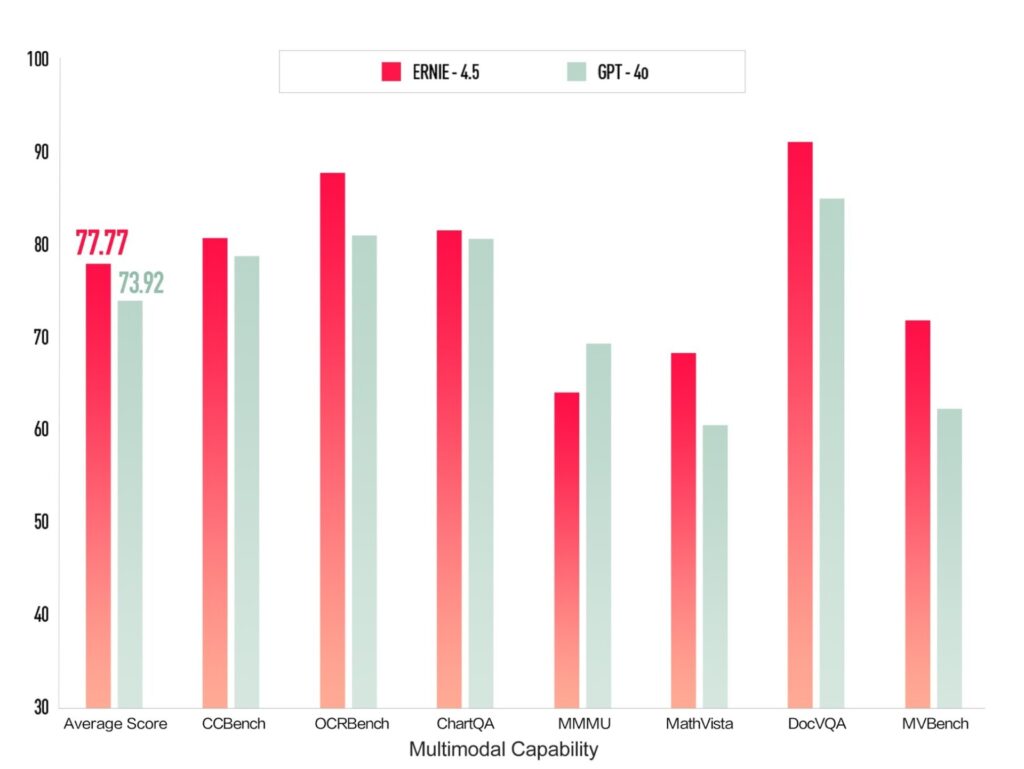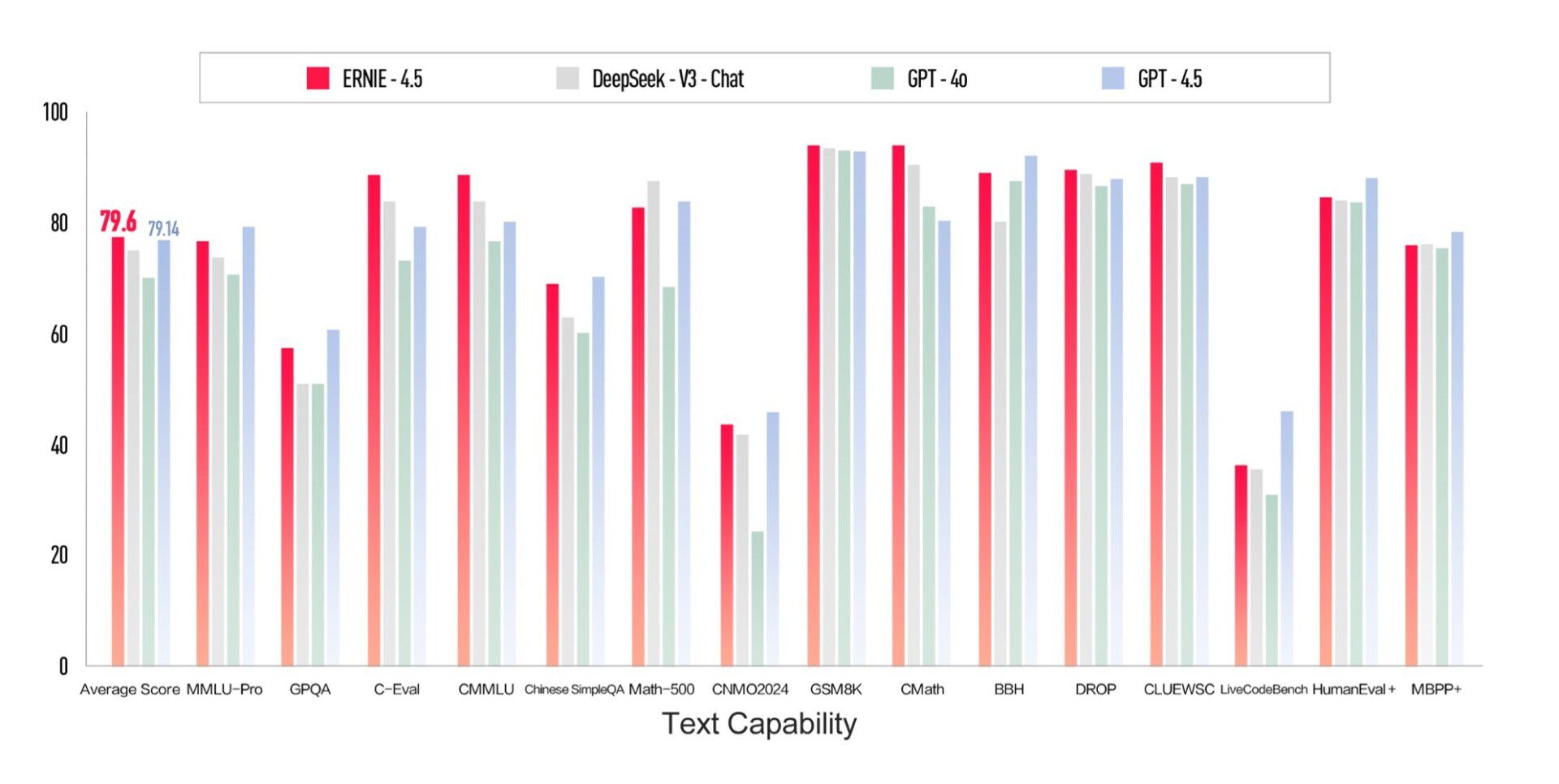In a bold move to solidify its position in the AI landscape, Baidu has introduced two powerful AI models—ERNIE 4.5 and ERNIE X1—marking a significant step forward for China's AI industry. With competitive pricing, advanced capabilities, and broad accessibility, these models signal Baidu’s intent to challenge global AI leaders, including OpenAI and DeepSeek.
Table of Contents
ToggleThe Rise of Baidu’s AI: ERNIE 4.5 and ERNIE X1
ERNIE 4.5: A Multimodal Powerhouse
Baidu’s flagship AI model, ERNIE 4.5, is designed to handle multimodal tasks, integrating text, images, video, and audio processing. According to Baidu, ERNIE 4.5 outperforms OpenAI’s GPT-4.5 in multiple benchmarks while being significantly more cost-effective—priced at just 1% of GPT-4.5’s cost.

This makes ERNIE 4.5 an attractive alternative for enterprises and developers looking for high performance without the high costs associated with Western AI models.
ERNIE X1: Advancing AI Reasoning Capabilities
ERNIE X1 is Baidu’s latest reasoning model, optimized for complex analytical tasks, AI-generated imagery, and comprehensive webpage analysis. The model directly competes with DeepSeek’s R1, offering similar performance at half the price. This pricing strategy positions Baidu as a formidable contender in China’s increasingly competitive AI market.
Strategic Integration and Market Accessibility
Baidu is strategically integrating ERNIE 4.5 and ERNIE X1 across its ecosystem. The company has announced that its chatbot, ERNIE Bot, will be available to the public for free starting April 1. Additionally, ERNIE 4.5 is accessible via APIs on Baidu AI Cloud’s Qianfan platform, and ERNIE X1 will soon follow. This move aims to accelerate AI adoption across industries while expanding Baidu’s influence in AI-driven applications.
Competitive Landscape: How Baidu Stacks Up
Baidu’s latest advancements arrive in the midst of an intense AI competition in China. Several companies are pushing the boundaries of AI development, each with distinct strategies and innovations:

- DeepSeek AI: The company’s R1 model has gained traction for its high performance at a lower cost than OpenAI’s ChatGPT. Baidu’s ERNIE X1 directly targets this market segment, aiming to offer a superior alternative at an even lower price.
- Alibaba’s QwQ-32B: Alibaba continues to enhance its large language models, focusing on enterprise AI solutions.
- Tencent’s Yuanbao: Tencent’s AI model has been making strides in commercial applications, emphasizing customization and integration into Tencent’s vast ecosystem.
Market Reaction and Investor Confidence
The announcement of ERNIE 4.5 and ERNIE X1 has positively impacted Baidu’s market performance. Following the launch, Baidu’s U.S.-listed shares rose by 1.23%, reaching $94.97 in pre-market trading. Investors see this development as a strong indication of Baidu’s long-term AI strategy and potential to rival global AI leaders.
Consumer Behavior and Adoption Trends
China’s AI sector is experiencing rapid adoption across multiple industries. Baidu’s AI models are expected to drive significant changes in search, e-commerce, and digital content generation.
- AI-Driven Search: With Baidu Search being the dominant engine in China, ERNIE 4.5 is likely to enhance user experiences through more accurate and contextual search results.
- E-Commerce: AI-powered recommendation engines will benefit from improved data processing, offering consumers more personalized shopping experiences.
- Digital Content Generation: ERNIE X1’s reasoning capabilities may fuel advancements in automated content creation, reducing reliance on human-generated materials while increasing efficiency.
Challenges and Controversies
While Baidu’s AI advancements present exciting opportunities, they also raise significant challenges:
- Ethical AI and Bias: Concerns persist over potential biases in AI-generated content. China’s strict regulations on AI development necessitate careful monitoring to ensure compliance.
- Data Privacy and Security: As AI adoption grows, data privacy becomes a pressing issue. Baidu must navigate regulatory requirements while maintaining user trust.
- Global AI Competition: Despite its dominance in China, Baidu faces stiff competition from Western AI giants like OpenAI and Google DeepMind, which continue to advance their models at a rapid pace.
The Future of AI in China and Beyond
Baidu’s unveiling of ERNIE 4.5 and ERNIE X1 underscores the accelerating AI race in China. With competitive pricing, strategic integrations, and continuous innovation, Baidu is positioning itself as a key player in the global AI arena. However, as the market evolves, success will depend on how effectively Baidu can scale its models, address ethical concerns, and sustain long-term technological leadership.
As China continues to push the boundaries of AI, Baidu’s latest models may shape the future of digital interactions—not just within China, but on a global scale.




